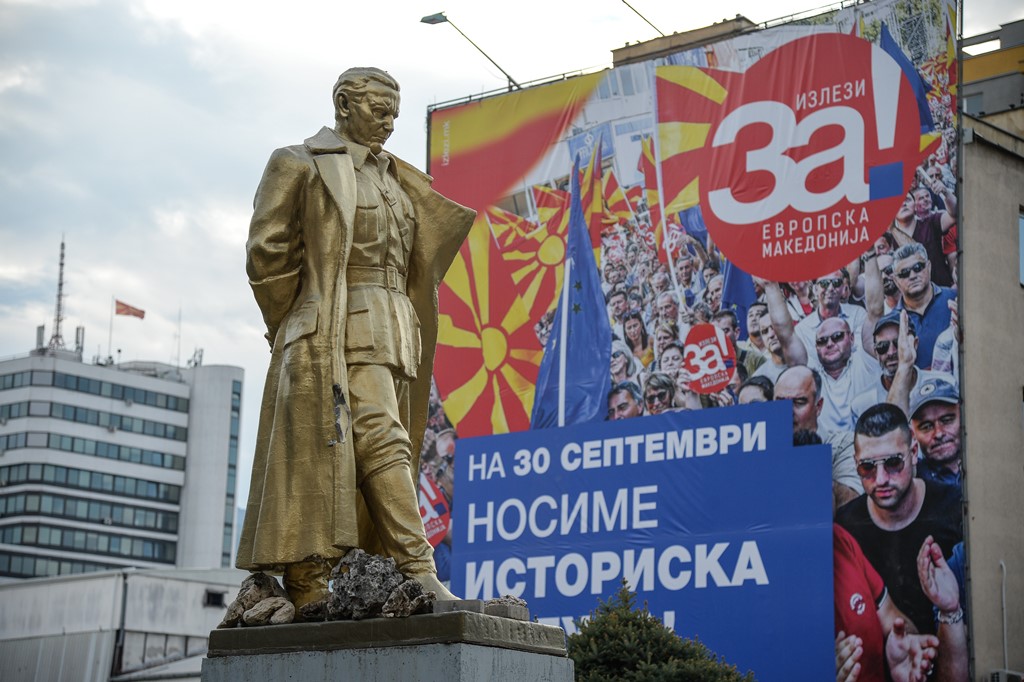Referendum in Macedonia on the Country’s Name

What was the referendum about and what was the result?
The referendum question was: “Are you for membership in the EU and NATO by accepting the agreement between the Republic of Macedonia and the Republic of Greece?” Known as the Prespa Agreement, it was agreed by Prime Ministers Zoran Zaev and Alexis Tsipras in June. The central point is the change of the official name of the state to the “Republic of North Macedonia”, which would replace the constitutional name “Republic of Macedonia”, and the one used in the United Nations, the “Former Yugoslav Republic of Macedonia”. Over 91.5% of voters were in favour of the agreement, and less than 5.7% were against, which is why the government announced it was a success. Turnout, though, was less than 36.9%. The majority of opponents of the agreement boycotted the referendum and announced the vote as a failure.
What are the positions of the major political forces?
The “for” campaign was carried out by the government of the Social Democratic Union of Macedonia and the Union for Democracy (of the Albanian community), as well as other national minorities’ parties. The boycott movement (#Bojkotiram), in turn, was created mainly by small non-parliamentary parties. It was supported by the republic’s president, Gjorge Ivanov, from the conservative Internal Macedonian Revolutionary Organization–Democratic Party for Macedonian National Unity (VMRO-DPMNE). He called for a boycott during the General Assembly at the UN three days before the referendum. However, VMRO-DPMNE itself—the largest opposition party today but ruling in 2006-2017—took an ambiguous position, although statements by its chairman, Hristijan Mickoski, indicated that he supported the boycott. Some of the party’s members declared they would vote against the agreement, with only a few for it.
What are the arguments of the supporters and opponents of the agreement?
The main point in the dispute is national identity. Supporters of the agreement emphasize that it guarantees the preservation of the terms “Macedonian language” and “a Macedonian”. In fact, it also introduces a new term: “Macedonian/citizen of the Republic of North Macedonia”, which will be used in travel documents. They indicate that this accord is the only way for Macedonia’s Euro-Atlantic integration, which has been blocked for more than a decade by Greece. They emphasize the lack of an alternative solution. The opponents, in turn, point out that not only will all state institutions have to add “Northern” to the name of Macedonia, but the identity will also change through the colloquial use of “North Macedonian” for its citizens. Moderate opponents of the agreement say it lacks international guarantees while the radical ones cite it as a betrayal of those who fought for Macedonia. President Ivanov has referred to the name change as “historical suicide”.
What are the consequences of the low turnout?
While turnout was lower by more than a dozen percent compared to an August likely voter survey and the government’s expectations, the referendum was consultative and its result is non-binding because—regardless of the result—changes to the constitution require a qualified majority of two-thirds of the 120-member parliament. Hence, from a legal point of view, turnout was not important, but it does have political significance. VMRO-DPMNE had announced it would not support the agreement if turnout did not exceed 50%. Meanwhile, the coalition will need about 10 votes from this party even with support from the small opposition parties. Zaev announced he would seek these votes, counting on obtaining them when there are divisions within the largest opposition party.
What are the possible scenarios?
Zaev’s chances to gain support from enough VMRO-DPMNE members to pass the constitutional change seem small. This is because the party refers to the vote as “massive unattendance”. At the same time, it does not politically represent the boycott supporters and in fact, the turnout among the residents of Macedonia was underestimated because of outdated electoral lists as a result of the lack of a census since 2001 and migration of a significant number of voters registered in the country. An alternative Zaev has proposed to win implementation of the agreement is another early parliamentary election. In this situation, the EU and the U.S. can be expected to engage in talks with some in the opposition to sway them to back implementation of the agreement, citing an election as yet another delay in the country’s Euro-Atlantic integration.

